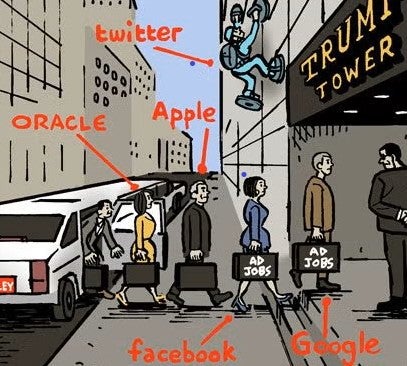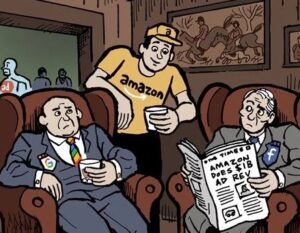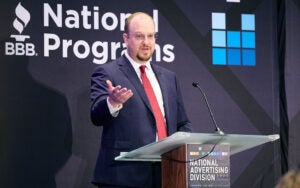Maybe We’re Not The Main Character?
After Paramount announced in July that it would end “The Late Show With Stephen Colbert,” laypeople assumed the network was kowtowing to pressure from the Trump administration.
But over in Ad Tech Land, some leaders considered Paramount’s decision evidence of linear TV’s dwindling significance. Well, now it’s happened again, and it’s not related to declining viewership.
On Wednesday, FCC Chairman Brendan Carr threatened to take action against ABC for comments Jimmy Kimmel made about the murder of Charlie Kirk on Monday night’s “Jimmy Kimmel Live!” episode. Almost immediately, conservative broadcast station groups Nexstar and Sinclair announced plans to stop airing the show on ABC affiliates, and, shortly after, Disney suspended Kimmel’s show “indefinitely.”
During an Air Force One press briefing on Thursday, President Trump criticized network evening shows, complaining that “all they do is hit Trump. They’re licensed. They’re not allowed to do that.” And back in July, Trump responded to Colbert’s cancellation by saying that Kimmel was next.
Not for nothing, but it was also in July when Paramount narrowly won approval from the FCC for its now-completed merger with Skydance. Meanwhile, Nexstar’s planned merger with Tegna is still subject to FCC approval. Oh, and Disney has its acquisition of Fubo in the works, pending DOJ review.
That’s Cold
It’s official: Your $1,800 fridge is going to show you ads.
Samsung home appliance owners were unsettled earlier this week to discover a software update that seemed to presage ad placements on upscale refrigerator screens. Perhaps it was a mistake or a change meant for other appliances?
But no.
Android Authority confirms the inevitable, which is that whether fridge owners like it or not, promos will be coming to those screens when the appliances are in idle mode. The pilot will start in the US on Samsung Family Hub fridges, where as much as half the appliance is taken up by digital display panels. But the plan is to roll out from there.
Critics long saw this move coming, but Samsung denied plans to bring ads to fridges as recently as April – a take that aged like unrefrigerated milk.
“Samsung is committed to innovation and enhancing every day value for our home appliance customers,” the company now says in a statement given to Android Authority.
But there will be a few safeguards. The ads, for example, won’t cover up any screen space in “Art Mode” or while running family photo albums – a nod to the old family fridge, back when its doors held magnets instead of pixels.
Tabled
Adweek reports that The Trade Desk has folded on a much-maligned aspect of its Kokai ad platform, the so-called “Programmatic Table,” a periodic table-esque visualization for campaign planners that campaign planners hated.
Now, once again for TTD, as in other DSPs, campaign visualization will come in a more familiar spreadsheet-like layout.
“We know that it was a pain point for some to learn what functions were able to be taken via the Programmatic Table at different platform levels,” according to a client email sent by The Trade Desk about the change. “We also understand that the table could be overwhelming and difficult to navigate.”
Advertisers want AI-based products like Kokai, Google’s Performance Max, Amazon Performance+, Meta Advantage+ shopping campaigns, etc., mostly because they make their jobs really, really easy. Which is why the Programmatic Table fell flat.
Google’s and Amazon’s respective product announcements these days all boast of “one-click” features and campaign setups.
But Kokai involved a lot of clicks – and The Trade Desk can’t ask its client base to keep learning something new when TTD’s biggest rivals offer blissful ignorance.
But Wait! There’s More!
Jimmy Fallon – the other late night talk show Jimmy – dropped out of Fast Company’s Innovation Festival at the last minute. [Business Insider]
Ad tech company Verve Group acquired search intelligence platform Captify. [release]
Yahoo DSP is luring customers away from The Trade Desk with lower costs. [Adweek]
How CTV advertisers are using smart speaker voice commands to create new shoppable experiences. [The Drum]
Mark Zuckerberg’s live demonstration of Meta’s AI glasses did not go as expected. (Meaning, it didn’t work.) [Mashable]
Librarians are increasingly having to tell prospective lenders that the book titles they’re asking for were hallucinated by an AI. [404 Media]
Nvidia invested $5 billion in Intel and announced that the two companies will jointly develop PC and data center chips, joining the federal government and SoftBank in the effort to prop up the US chipmaking industry. [The Verge]
You’re Hired!
Datalinx AI, which calls itself an “AI data refinery,” appoints its co-founders, Nicole Landis Ferragonio and Alek Liskov, as chief product officer and chief AI officer, respectively. [release]
Olivia Nuzzi, who left New York Magazine after failing to disclose her relationship with a former subject (RFK Jr.), has been named West Coast Editor of Vanity Fair. [Vanity Fair]
Here’s today’s AdExchanger.com news round-up… Want it by email? Sign up here.

















